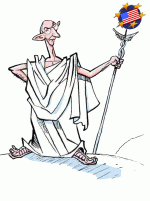Transatlantic travesty
EU Trade Commissioner Pascal Lamy and his army of trade bureaucrats working in the EU's Directorate General Trade department are keen supporters of the Transatlantic Business Dialogue (TABD), a forum for powerhouse multinationals and businesses to advise and influence transatlantic trade policies. Since 1995, the largest EU- and US-based corporations have worked closely with the Commission and the US government through the TABD to remove "obstacles to transatlantic trade" and boost EU-US powers within the World Trade Organisation (WTO).[1] The TABD's current leadership duo are Philip Condit, CEO of Boeing, and Jürgen Strube, BASF chairman.
EU and US civil society groups blast the TABD process as unaccountable, undemocratic, and harmful to environmental and consumer concerns. The groups have met annual TABD conferences in Cincinnati (2000), Stockholm (2001) and Chicago (2002) with demonstrations, counter-summits, and other protests.
Trade Commissioner Lamy stubbornly defends the business forum. "We need more input from processes such as the TABD, not less", he told the business group's 2002 conference.[2] Recently however, the TABD, suffering from what Lamy described as a "sort of fatigue problem", was relaunched in a leaner format.[3] Indeed, it is doubtful whether it would have survived without intervention by the European Commission. In defence of its far-reaching support for the TABD, the Commission cites parallel consumer, environment, and labour dialogues, conveniently neglecting to mention that these never had any powers comparable to the TABD's. The Commission also fails to mention that the environment and labour dialogues ceased to exist years ago.
Lamy has ulterior motives for his deep devotion to the TABD. The group can help merge EU-US business positions on WTO issues, resulting in a formidable joint EU-US government agenda in WTO negotiations. What other government can block such a force?
The TABD has done its best to delay, water down, and block environmental and consumer protection legislation in Europe. Some examples: the Austrian, Danish, and Swiss bans on climate-destabilising HFC gasses, EU rules for animal testing for cosmetics, and the EU's new chemicals policy overhaul (REACH). Part of the TABD's toolbox is the so-called Early Warning System. Acting on TABD advice, the EU and US administration have developed a system to identify emerging issues that could turn into disputes. Translation: the EU and United States treat progressive policy proposals as barriers to trade and throw wrenches into the works at the earliest stage of negotiations.
"It is the EU and member state domestic regulations and public policies which concern us most of all", a US industry lobbyist explains.[4] The Commission must ask itself: With corporations stepping up their assault on progressive environment and consumer regulations, is the Commission's continuing far-reaching support for the TABD in the best interest of Europe's citizens?
Notes:
- For background information on the TABD see, TABD Takes Up Arms; Post-September 11, major EU and US arms producers take a leading role in the ailing group, Corporate Europe Observer, Issue 11, May 2002. Back
- Speech by EU Trade Commissioner Lamy at Transatlantic Business Dialogue CEO Conference, Chicago, November 8, 2002. Back
- The June 24, 2003 meeting, hosted by US Secretary of Commerce Donald Evans, was also attended by Enterprise Commissioner Erkki Liikanen and 18 CEOs from a wide range of industries on both sides of the Atlantic. "'New life' for EU-US business dialogue", European Voice, June 26, 2003. Back
- Gary Litman of the US Chamber of Commerce, a powerful US lobby group. "EU, US talks spur concerns on trade", The Washington Times, June 24, 2003. Back
